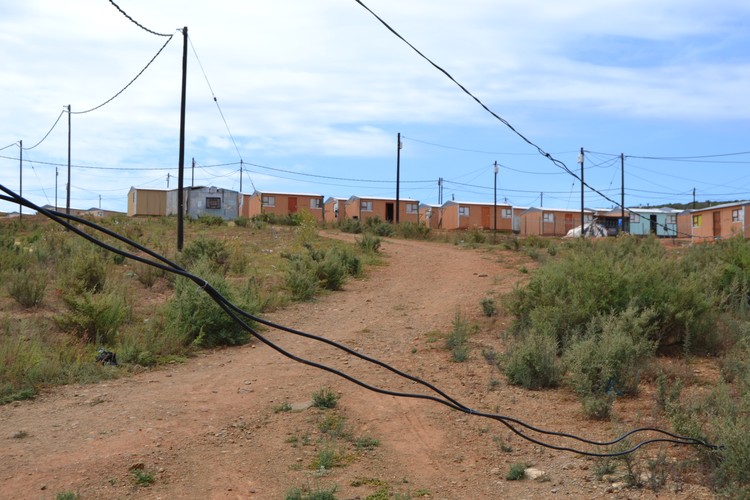Tension over electricity between families in shacks and government housing in Kariega
Wires swing like washing lines from the bungalows to the shacks
Illegal connections have been made from the bungalows in Area 11, Gunguluza in Kariega to the neighbouring shacks. The shack dwellers say they have been living without electricity for almost four years. Photos: Thamsanqa Mbovane
- Elderly people and people with disabilities living in bungalows in Gunguluza in Kariega say they are battling with illegal electricity connections from the neighbouring informal settlement.
- They say they are too scared to prevent the connections.
- The Nelson Mandela Bay Municipality is currently installing electricity meter boxes in the bungalows.
- This has angered the shack dwellers who say they have been asking for their homes to be electrified for almost four years.
Long black wires hang like washing lines from poles and on the busy footpath across an empty field between the bungalows of Gunguluza in Kariega and the neighbouring informal settlement which is home to about 2,000 shack dwellers.
The fully serviced bungalows were put up by the Nelson Mandela Bay Municipality in 2020 to house vulnerable groups including elderly and disabled people during the Covid pandemic.
The municipality is currently installing electricity meter boxes in the bungalows with four large transformers and dozens of electricity poles. Meanwhile, people living in the informal settlement just metres from the bungalows are complaining that their pleas for electricity have been ignored for nearly four years. Many have now resorted to making illegal connections from the bungalows.
Elderly people and people with disabilities living in the bungalows say they are too scared to stop them. Residents, who asked not to be named in fear of being targeted, say they worry about their safety and the safety of learners who regularly use the footpath.
“We are afraid of people using illegal connections because they steal our electricity in broad daylight. They even swear at us. We watch them steal our electricity because there’s nothing we can do,” said an elderly woman who did not want to give her name.
Another resident who moved into a bungalow this year says her 21-year-old daughter is disabled and confined to a bed.
“We asked municipal officials from the electricity directorate to handle this, because we don’t want these people to kick in our doors at night when we disconnect them from our poles,” she says.
People gather in the street in Area 11 on 23 November after a small transformer exploded and a pole caught alight.
The chair of the development committee, Siyabonga Stemele, told GroundUp that the municipality had failed to explain to shack dwellers, who have been waiting for years, when they will get electricity.
“All shack dwellers in Area 11 have no electricity, while bungalows are connected. The municipality is busy putting electricity poles in certain sections of Gunguluza, telling us they are busy drawing up a new map. This is the reason people have decided to steal electricity from the elderly citizens and disabled people,” he said.
Questions sent to the Nelson Mandela Bay Municipality last week had not been answered by the time of publication.
But in a statement this week, Mayco member for electricity and energy, Lance Grootboom said 23,000 people in the metro had responded to an invitation to declare tampering with their meters in order to have fees waived. The municipality is now giving customers a second chance to apply for the fees waiver, until January 2023.
Support independent journalism
Donate using Payfast

Don't miss out on the latest news
We respect your privacy, and promise we won't spam you.
Next: Stellenbosch backyarders threaten to occupy golf course
Previous: GroundUp article ignores the rights of content creators
© 2022 GroundUp. This article is licensed under a Creative Commons Attribution-NoDerivatives 4.0 International License.
You may republish this article, so long as you credit the authors and GroundUp, and do not change the text. Please include a link back to the original article.
We put an invisible pixel in the article so that we can count traffic to republishers. All analytics tools are solely on our servers. We do not give our logs to any third party. Logs are deleted after two weeks. We do not use any IP address identifying information except to count regional traffic. We are solely interested in counting hits, not tracking users. If you republish, please do not delete the invisible pixel.


